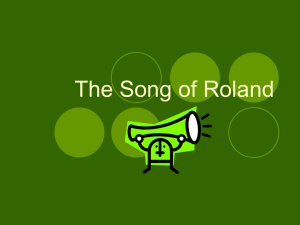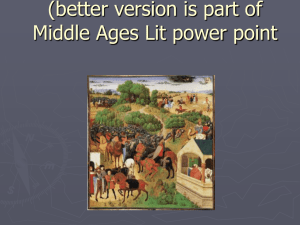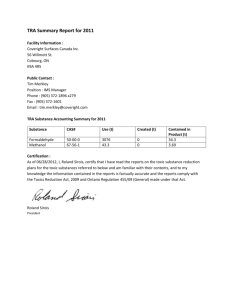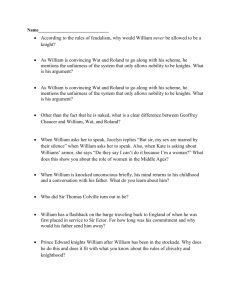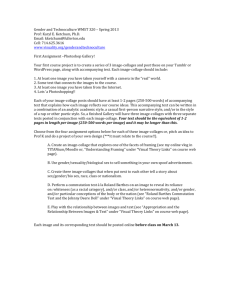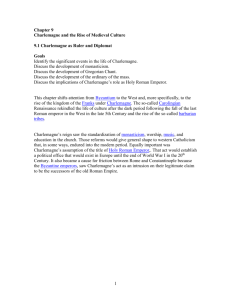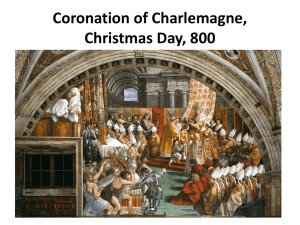Background: The Song of Roland as History
advertisement
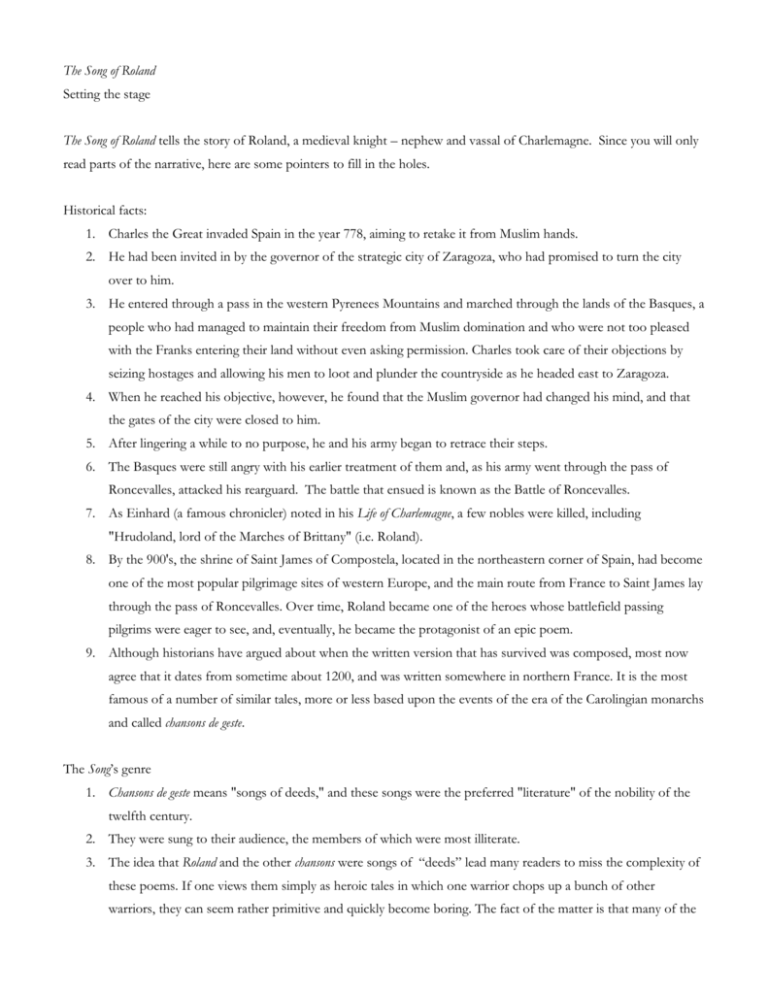
The Song of Roland Setting the stage The Song of Roland tells the story of Roland, a medieval knight – nephew and vassal of Charlemagne. Since you will only read parts of the narrative, here are some pointers to fill in the holes. Historical facts: 1. Charles the Great invaded Spain in the year 778, aiming to retake it from Muslim hands. 2. He had been invited in by the governor of the strategic city of Zaragoza, who had promised to turn the city over to him. 3. He entered through a pass in the western Pyrenees Mountains and marched through the lands of the Basques, a people who had managed to maintain their freedom from Muslim domination and who were not too pleased with the Franks entering their land without even asking permission. Charles took care of their objections by seizing hostages and allowing his men to loot and plunder the countryside as he headed east to Zaragoza. 4. When he reached his objective, however, he found that the Muslim governor had changed his mind, and that the gates of the city were closed to him. 5. After lingering a while to no purpose, he and his army began to retrace their steps. 6. The Basques were still angry with his earlier treatment of them and, as his army went through the pass of Roncevalles, attacked his rearguard. The battle that ensued is known as the Battle of Roncevalles. 7. As Einhard (a famous chronicler) noted in his Life of Charlemagne, a few nobles were killed, including "Hrudoland, lord of the Marches of Brittany" (i.e. Roland). 8. By the 900's, the shrine of Saint James of Compostela, located in the northeastern corner of Spain, had become one of the most popular pilgrimage sites of western Europe, and the main route from France to Saint James lay through the pass of Roncevalles. Over time, Roland became one of the heroes whose battlefield passing pilgrims were eager to see, and, eventually, he became the protagonist of an epic poem. 9. Although historians have argued about when the written version that has survived was composed, most now agree that it dates from sometime about 1200, and was written somewhere in northern France. It is the most famous of a number of similar tales, more or less based upon the events of the era of the Carolingian monarchs and called chansons de geste. The Song’s genre 1. Chansons de geste means "songs of deeds," and these songs were the preferred "literature" of the nobility of the twelfth century. 2. They were sung to their audience, the members of which were most illiterate. 3. The idea that Roland and the other chansons were songs of “deeds” lead many readers to miss the complexity of these poems. If one views them simply as heroic tales in which one warrior chops up a bunch of other warriors, they can seem rather primitive and quickly become boring. The fact of the matter is that many of the chansons are actually concerned with legal points, and more than a few, like The Song of Roland, have an actual trial as their central episode. 4. This is not to say that the smash and stab parts of these poems are not important. The audience probably loved them, but they realized that they were incidental to the main action. However, one tends to find out a good deal about the characters of the actors in the drama during these episodes – which is why the selections you have been assigned deal in great part with the battle itself. 5. Another thing to remember is that medieval authors were not "primitive" or "unsophisticated." They expect their audience to pay close attention to what they were relating and to think about what they were hearing or reading. They also expected them to be familiar with the situations being pictured for them. The Song of Roland’s plot and the concept of fealty 1. It was the duty of every feudal vassal, for instance, to "pay court" to his lord. That meant that the vassal was supposed to present himself on those occasions when the lord called for an assembly to consider problems, to hear complaints and settle disputes, to receive embassies, or anything else requiring serious thought and discussion. 2. Most of the audience of The Song of Roland had experience in such meetings or was at least learning how one should behave when their lord asked them for "aid and counsel." So it should not come as a surprise to see that The Song of Roland begins by providing the background necessary to understand why Charlemagne had called a council of his nobles and what issue the members of the council were suppose to discuss and offer advice about. 3. You might keep in mind that a lord was supposed to treat his vassals with respect and honor. This meant that he couldn't ask for their advice and simply reject it if it didn't suit him since that would not be showing his counselors the respect they deserved. Medieval councils were not rubber stamps [They didn't have rubber, in any event. It was one of the things that they discovered in the New World.] 4. The story opens with a meeting of the council to decide whether to attack Marsile of Zaragoza, send another ambassador to negotiate with him (he had the last two ambassadors chopped up into little pieces and sent them back to Charlemagne in a basket), or simply pack up and go home. 5. When the council begins, Roland is the first to speak, arguing against going home even though the army has been in Spain for seven years and has gotten quite war-weary. Whoa! Roland is only about eighteen years old, a rather rash young man. It's customary in council for the oldest and most experienced members to speak first, and Roland has just behaved in a very offensive manner. Of course, he is Charlemagne's nephew, the son of Charlemagne's sister, but that's not good enough to excuse his action. 6. Ganelon, as his stepfather, admonishes him, as it is a father's (or a stepfather's) duty to rein his son in when he is behaving badly. But Roland turns on Ganelon and simply ridicules him. Ganelon tells Roland that he has never shown the proper deference to his stepfather, a way of pointing out to the other members of the council that he is not responsible for his stepson's lack of manners. Roland answers by insulting him even more viciously. Something is obviously very wrong here, and whatever it is simply gets worse. 7. The council is finally swayed into recommending another embassy. I don't know about you, but I would not have relished the idea of being an ambassador to a man who had a record of chopping ambassadors up into little pieces. The members of the council volunteer one by one, and Charlemagne rejects them on the grounds that he can't afford to lose them. Roland then volunteers his stepfather, and Charlemagne accepts the nomination. Ganelon flies into a rage and says that Roland is trying to get him killed. He then promises to take vengeance on Roland if he gets out of this alive. Charlemagne does nothing to stop it [except to say "tut, tut"]. 8. Instead, Charlemagne gives Ganelon a sealed letter to deliver to Marsile, outlining terms for a peace, and hands him the wand that will make Ganelon his herald and official representative. But the wand falls before Ganelon can get a grip on it, and he has to pick it up from the ground rather than receiving it from Charlemagne’s hand. This is a very bad omen, as it signifies that the feudal contract – represented by the handing of a glove – is about to be broken. 9. Indeed, Ganelon “betrays” his king and country in an effort to resolve his feud with Roland. He conspires with king Marsile, who is able to attack Charlemagne’s rearguard – which is lead by Roland – as they exit Spain. 10. The rearguard is decimated (pay attention to why and how). When the main army makes it back, they only find dead bodies. The pagans have fled, but the Franks pursue them, chasing them into the river Ebro, where they all drown. The Frankish army then confronts another Muslim army and, after a valiant fight, win. 11. Meanwhile, the Franks have discovered Ganelon's betrayal and keep him in chains until it is time for his trial. Ganelon argues that his action was legitimate revenge, openly proclaimed, not treason. 12. While the council of barons, which Charlemagne gathered to decide the traitor's fate is initially swayed by this claim, one man, Thierry, argues that, because Roland was serving Charlemagne when Ganelon delivered his revenge on him, Ganelon's action constitutes a betrayal of the emperor. Ganelon's friend Pinabel challenges Thierry to trial by combat; the two will fight a duel to see who's right. By divine intervention, Thierry, the weaker man, wins, killing Pinabel. The Franks are convinced by this of Ganelon's villainy and sentence him to a most painful death. The traitor is torn limb from limb by galloping horses and thirty of his relatives are hung for good measure.
